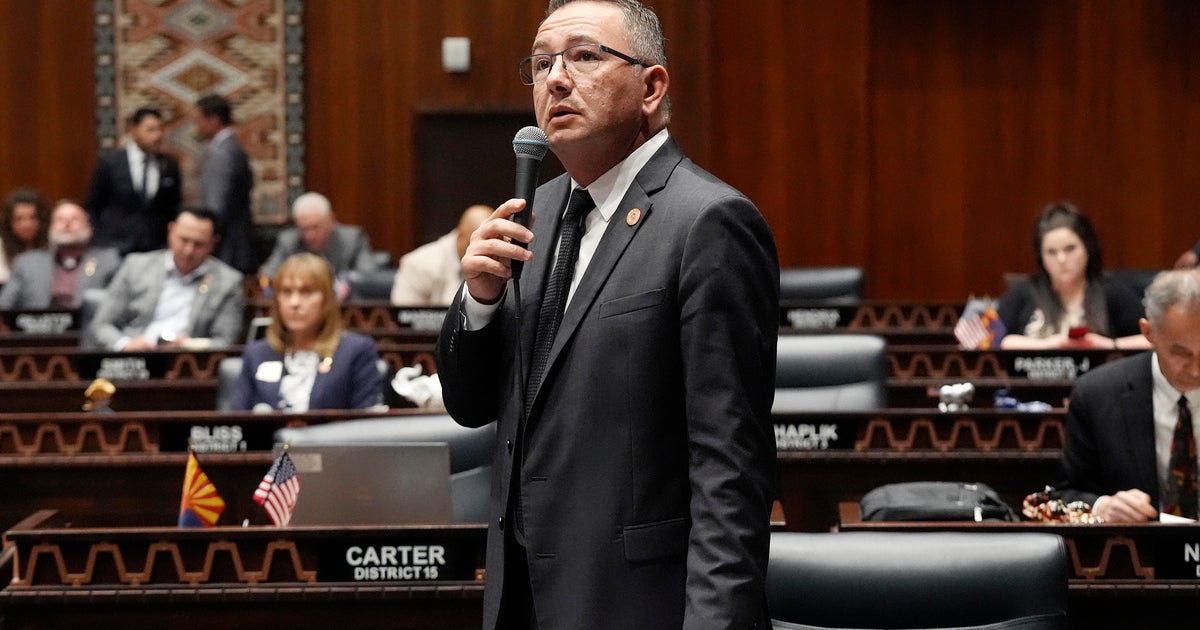Transcript: Sen. Tim Scott on "Face the Nation," August 12, 2018
The following is a transcript of the interview with Sen. Tim Scott, R-South Carolina, that aired Sunday, August 12, 2018, on "Face the Nation."
MARGARET BRENNAN: We sat down earlier with South Carolina Republican Tim Scott. He joined us from Mount Pleasant, just outside Charleston. We asked him how Americans should understand this moment -- when later today white supremacists will be rallying in front of the White House.
SENATOR TIM SCOTT: Well certainly it's obvious that we continue to exercise our freedom of speech guaranteed by the Constitution and it certainly should also be an opportunity for us to thank the good Lord that we have signs of progress in this nation and that we have much progress still to be made. The fact of the matter is that I am thankful to live in a state where I have seen the evolution of the human heart and I hope that the rest of the nation takes the time to find a way to break bread with someone who is not like themselves. To say to those folks who believe that there is one superior race that they are dead wrong. And that this country will always come together in a way that blesses each other because we are one nation under God. And I believe that we are indivisible.
MARGARET BRENNAN: President Trump mentioned the riots in Charlottesville in a tweet and said he condemns all types of racism and acts of violence. Last year you said the president can be racially insensitive. Do you still believe that?
SEN. SCOTT: Well certainly his tweets yesterday morning were a positive sign of a better direction for the nation without any question. The president condemning all acts of racism and violence is a positive step in the right direction. And more importantly after my meeting with the president he asked me last year- for Charlottesville- he asked me what can he do to make a difference in this country, bringing people together. I laid out something that I thought would be very powerful and that was the opportunity zones. Bringing more resources back into distressed communities. We celebrate the success of this economy without any question. But the reality of it is, that there are pockets in this nation where the recovery has been uneven and the opportunity zone legislation, supported by the president, will have a positive impact. A powerful impact in communities that are distressed and disproportionately communities that are black and brown.
MARGARET BRENNAN: When will those communities feel the impact of that money being disbarred? I mean what- when will they see it? Where?
SEN. SCOTT: Well we're waiting on the Treasury Department to finish the guardrails. The good news is I was in Mississippi on Thursday and there are a number of projects waiting for the guidance to be delivered. So we are probably about 30 days away from the final regulations that will allow opportunity funds to be created and opportunity zones to be populated with new investment, new resources, and hopefully minimizing gentrification at the same time.
MARGARET BRENNAN: Do you think that that has helped the president restore the moral authority that you said had been compromised last year?
SEN. SCOTT: I think there are a number of steps that the president has taken to move us in a better direction. Opportunity zones was certainly my number one ask- he said yes, so that's good news. Number two, he has spent more time meeting with African-American pastors and business leaders, many of whom, at least on the business side, have brought to the White House and meeting with the vice president so they have invested more time and energy in that direction. And then another bright spot is the president's plan and objective to work with both the House and the Senate to reduce recidivism which, well, focuses on prison reform. So I think if you look at the actual steps from the opportunity zones, to the meetings with pastors and business leaders, reducing recidivism, and without any question, the lowest African-American unemployment rate in the history of the country.
MARGARET BRENNAN: I know you recently met with President Trump about prison reform sentencing reform--
SEN. SCOTT: Yes ma'am.
MARGARET BRENNAN: --is also being discussed. But there is opposition within your party to some of this. There's also opposition from Attorney General Jeff Sessions at coupling these things together. What prospects are there for actually getting this through the Senate and for reducing mandatory minimums?
SEN. SCOTT: The House passed a few weeks ago a prison reform legislation with over 300, I think 336 votes or so. That was a bipartisan effort. That bill has, I think, positive prospect from getting out of the Senate. The question is: Is there a way for us to add on top of the prison reform legislation, criminal justice reform that would give release valves on nonviolent, perhaps first time offenders? As opposed to having to deal with the mandatory minimums, having a way to reduce the sentence. That is a far more treacherous ground for us to wade through. But the president engaged in the conversation. I think we had meaningful conversation. I think there was reasonable progress.
MARGARET BRENNAN: I know that you recently signed onto a bill to make lynching a federal hate crime. It's something Congress has tried to do over the past hundred years 200 times and failed. Why are you the only Republican signing on to this?
SEN. SCOTT: Well I think I'm the first Republican. By the time we get this out of the Senate there will be several Republicans and there are- are some Democrats as well. The bill for us is--
MARGARET BRENNAN: There are 26 co-sponsors, including yourself. They're all Democrats.
SEN. SCOTT: Yes ma'am.
MARGARET BRENNAN: You're the only Republican.
SEN. SCOTT: Well sometimes it's good to be first. So I look forward to looking for ways to bring more folks on board. I think we will. The fact of the matter is that the lynching issue is an issue that we should have dealt with many years ago. It is still an issue that raises fear and trepidation in communities of color and frankly in any community in this nation we should all stand together and say that lynching is a hate crime. Be done with it and move on. I think we'll see a bipartisan coalition coming together on that- on that bill.
MARGARET BRENNAN: Do you feel alone in your party on some of these issues of racial justice?
SEN. SCOTT: I don't. I honestly think that a lot of Republicans are leaning forward. The fact of the matter is that the meeting at the White House was set up by the Judiciary Committee Senator Grassley to meet with the president to talk about specifically how the criminal justice system can be improved for those folks who are the most vulnerable in the system. That was led by Senator Grassley whom others have said about Senator Grassley, he would never, never allow a criminal justice piece of legislation to lead the judiciary, here we sit on the cusp of seeing that happen. So, Lindsey Graham has led on the issues of young African-American males being disproportionately represented in the criminal justice system. Michael Lee has worked on fairness in the criminal justice system. Ted Cruz is working on that as well. So there are a number of us who are working on the issue. The fact that I'm the leading cosponsor on the lynching legislation is true but it does not necessarily tell the whole story on other Republicans who are engaged in the process of making sure that we have a level playing field in the criminal justice space.
MARGARET BRENNAN: So you're going to deliver their votes on your lynching bill?
SEN. SCOTT: Well, I'm not going to ever say that I'm going to deliver anything that I cannot guarantee that I'm going to deliver. I am confident that I will have more than just myself as a Republican on the bill. This show will actually bring more Republicans on board. By the time we're finished than I did before we started so thank you very much for that.
MARGARET BRENNAN: Republicans like to refer to themselves as the party of Lincoln. Do you think that that legacy is being compromised by the party of Trump?
SEN. SCOTT:: I don't. I think we are going through some hard times without any question. The rhetoric is not always helpful. And the fact of the matter is the rhetoric comes from both sides that we can name some Congress members on the left who have said some poisonous and toxic things and I can certainly name folks on the right who have done the same thing. So the truth of the matter is the party of Lincoln I think is in fact standing strong in many ways. Criminal justice is a clear example. The opportunity zones was legislation supported by my friends on the other side but none of them in the end voted for it. Frankly, it was passed on all Republican votes. And now I have a lot of friends on the other side who are excited about it. There are strong signs from the White House to the both houses of Congress that we are making progress as the party of Lincoln. But the fact of the matter is that I'm more interested and more concerned with the progress of one nation and one American family than I am just the Republican Party. I am not first a Republican I'm first an American and my goal is to make sure that each and every American has a chance to experience their full potential. And that means sometimes you have to walk alone. Sometimes you have to say things that may not be popular and that's necessary in the times in which we live.
MARGARET BRENNAN: Do you think the current debate over immigration into this country, the travel ban as well, that that has hints in the president's rhetoric of racism?
SEN. SCOTT: Well, I think the president is looking to sec-secure the nation. There's no question that some folks took offense to some of his tweets or things that he said. I think Mia Love spoke out against it, I perhaps had a comment or two about calling countries, "blank-holes" I don't think that's helpful with that question I'm not sure that was specifically racial. I think it was just not helpful-not helpful and offensive. For me, I think the president's approach is clear on the issue of immigration. I was surprised and, perhaps pleasantly surprised, when the president suggested that he was willing to allow one point eight, one point nine million, DACA eligible folks to come and stay in the country and find a path to permanence. The truth of the matter is the docket numbers about 800,000 people so when the president announced a number that was a million higher than the actual folks that are eligible for DACA. That to me was a good sign that he was willing to negotiate. Unfortunately, sometimes the Democrats seemed more enamored with the issue than the solution. And that's the problem we ought solve.
MARGARET BRENNAN: I really appreciate you coming on the program today and talking to us and sharing your thoughts.
SEN. SCOTT: Have a great day.
MARGARET BRENNAN: And we'll be back in a moment.



